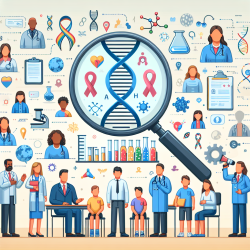As a special education director, staying informed about the latest research is crucial for providing effective support to students with developmental challenges. A recent study titled "Deletions in chromosome 6p22.3-p24.3, including ATXN1, are associated with developmental delay and autism spectrum disorders" offers valuable insights into the genetic factors contributing to these conditions. This blog will explore how practitioners can implement findings from this research to improve their skills and encourage further investigation.
The Significance of Chromosomal Deletions
The study highlights the impact of deletions in chromosome 6p22.3-p24.3 on developmental delays and autism spectrum disorders (ASDs). These deletions are relatively rare but have been linked to various neurological and behavioral abnormalities. The research identifies several genes within this chromosomal region that may contribute to ASDs and developmental delays, including ATXN1, DTNBP1, JARID2, and NHLRC1.
Implementing Research Findings in Practice
Special education practitioners can utilize the outcomes of this research in several ways:
- Personalized Education Plans: Understanding the genetic basis of a student's developmental challenges can help tailor educational strategies to their specific needs.
- Collaboration with Genetic Counselors: Working closely with genetic counselors can provide a deeper understanding of a student's condition and inform more effective intervention strategies.
- Professional Development: Attending conferences and webinars focused on genetic research can enhance practitioners' knowledge and skills in addressing complex cases.
Encouraging Further Research
The study underscores the importance of continued research into the genetic factors influencing developmental delays and ASDs. Practitioners can play a role in this ongoing effort by:
- Participating in Research Studies: Collaborating with researchers by providing data or participating in studies can contribute to a broader understanding of these conditions.
- Advocating for Funding: Supporting initiatives that fund genetic research can help uncover new insights that benefit students with developmental challenges.
- Networking with Researchers: Building connections with researchers can facilitate knowledge exchange and foster collaborative efforts to address complex educational needs.
The Role of Online Therapy Services
Companies like TinyEYE offer online therapy services that can be particularly beneficial for students affected by chromosomal deletions. These services provide accessible support tailored to individual needs, helping bridge gaps in traditional educational settings. By integrating online therapy into their practice, special education professionals can offer comprehensive support that addresses both educational and therapeutic needs.
Conclusion
The study on chromosomal deletions provides valuable insights that can enhance the practice of special education professionals. By implementing these findings and encouraging further research, practitioners can better support students with developmental delays and ASDs. To read the original research paper, please follow this link: Deletions in chromosome 6p22.3-p24.3, including ATXN1, are associated with developmental delay and autism spectrum disorders.










